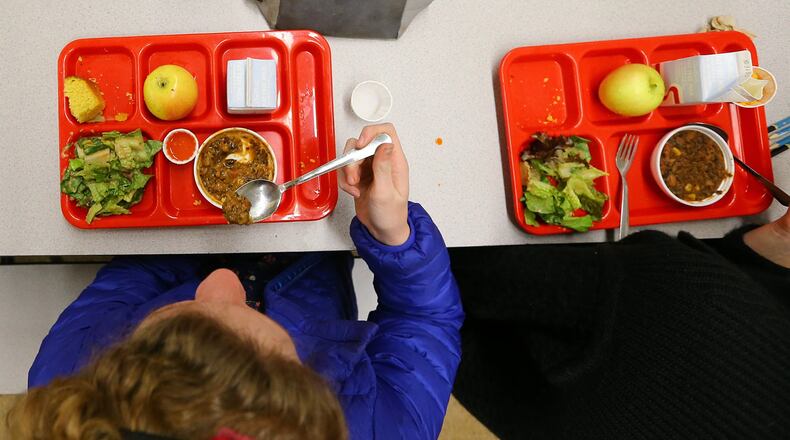Editor’s note: This story has been updated to reflect that City Schools of Decatur said the debt has been eliminated.
City Schools of Decatur has accumulated $88,000 in unpaid lunch fees since 2022.
The small district in DeKalb County drew some criticism this week for its plan to give students with unpaid balances an alternative meal of a cheese sandwich and milk — a procedure change meant to address the problem, officials said.
Decatur announced Thursday that a corporate foundation grant has eliminated all of the debt, and all past balances have been forgiven.
“As a public school district, we often have to make difficult decisions,” read a statement from the district. “However, we remain committed to providing healthy meal options for all students while working diligently to proactively prevent future debt recurrences.”
After the clock ran out in 2022 on a federal endeavor that gave free meals to every student, experts say lunch debt is a growing problem.
That’s how Decatur’s total inched so high. When the federal waivers ended, students who didn’t qualify for the normal free and reduced-price lunch program had to pay full price (a little over $3) for each meal. But Decatur, which has about 5,500 students, continued to give them out for free.
“There was definitely an increase” in school lunch debt after the pandemic, said Alessandra Ferrara-Miller, who founded a nonprofit that clears lunch debt called All for Lunch.
“You had people coming off of new financial struggles as a result of the pandemic,” she explained. “And then you had these two years worth of students who may have been new to the school system where their families had never had to carry the financial impact of school lunch.”
In a fall 2023 survey by the School Nutrition Association, districts across the country reported close to $18 million in unpaid meal debt. Per district, the number varied from just $10 to $1 million. The median meal debt has increased from $2,000 at the end of the 2014-15 school year to $5,495 in November 2023.
Metro Atlanta districts report varying amounts of meal debt and policies, which Ferrara-Miller said is typical. The U.S. Department of Agriculture does not recommend districts follow a specific policy, which is part of why students in some districts get a cheese sandwich, while others may still get a hot meal.
Buford City Schools in Gwinnett County is a similar size to Decatur, and reported an increase in student lunch debt since the pandemic. But that school system currently has $3,700 in meal debt, officials told the AJC. The district does not give alternative meals to students who can’t pay for lunches, but does restrict them from buying additional items like snacks and ice cream.
Many schools in the metro Atlanta area still qualify for a federal program that covers meals for all children at schools where enough families qualify for assistance. In some of those areas, districts are reporting much smaller amounts of school lunch debt. About 16% of Decatur’s students qualify for free and reduced-price meals.
DeKalb County — which has about 85,000 more students than Decatur — reported a current meal debt of $37,000. But most students in the district qualify for free and reduced-price meals, and about half of its schools qualify for free meals for all students. Additionally, thousands more students qualified for free and reduced-price lunches this year, the district reported. Those factors all helped minimize lunch debt, officials said.
Decatur’s plan to serve cheese sandwiches and milk to students with meal debt could shame those students, several parents and others complained on social media. Most schools take payment for lunches at the end of the lunch line, Ferrara-Miller noted, which can lead to a scene where students have to give up the lunch they planned to have and accept the alternate lunch in front of their peers. Many experts and advocates say the solution to meal debt — and the ensuing stress on students and families — is universal free lunch for children. But in the absence of that, nonprofits and individual donors have filled the gap by clearing meal debt.
All for Lunch, based in Cumming, donated $250,000 to more than 500 schools in 10 states last year. And businesses, GoFundMe campaigns and Facebook groups have organized to donate to metro Atlanta schools in recent years as well.
In addition to clearing existing debt, Decatur has also finalized agreements with organizations to provide additional assistance to individual families experiencing financial hardship.
About the Author
Keep Reading
The Latest
Featured

